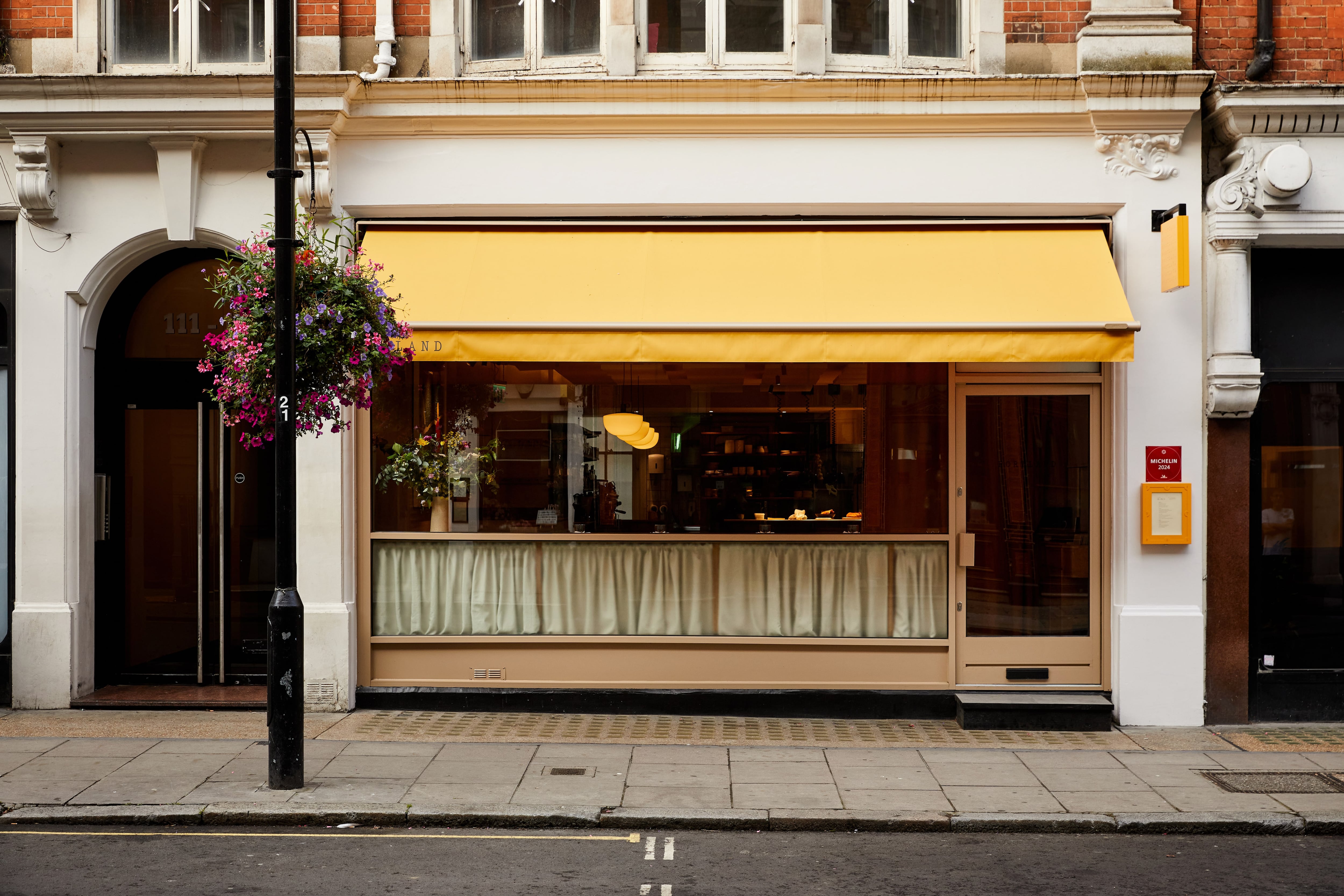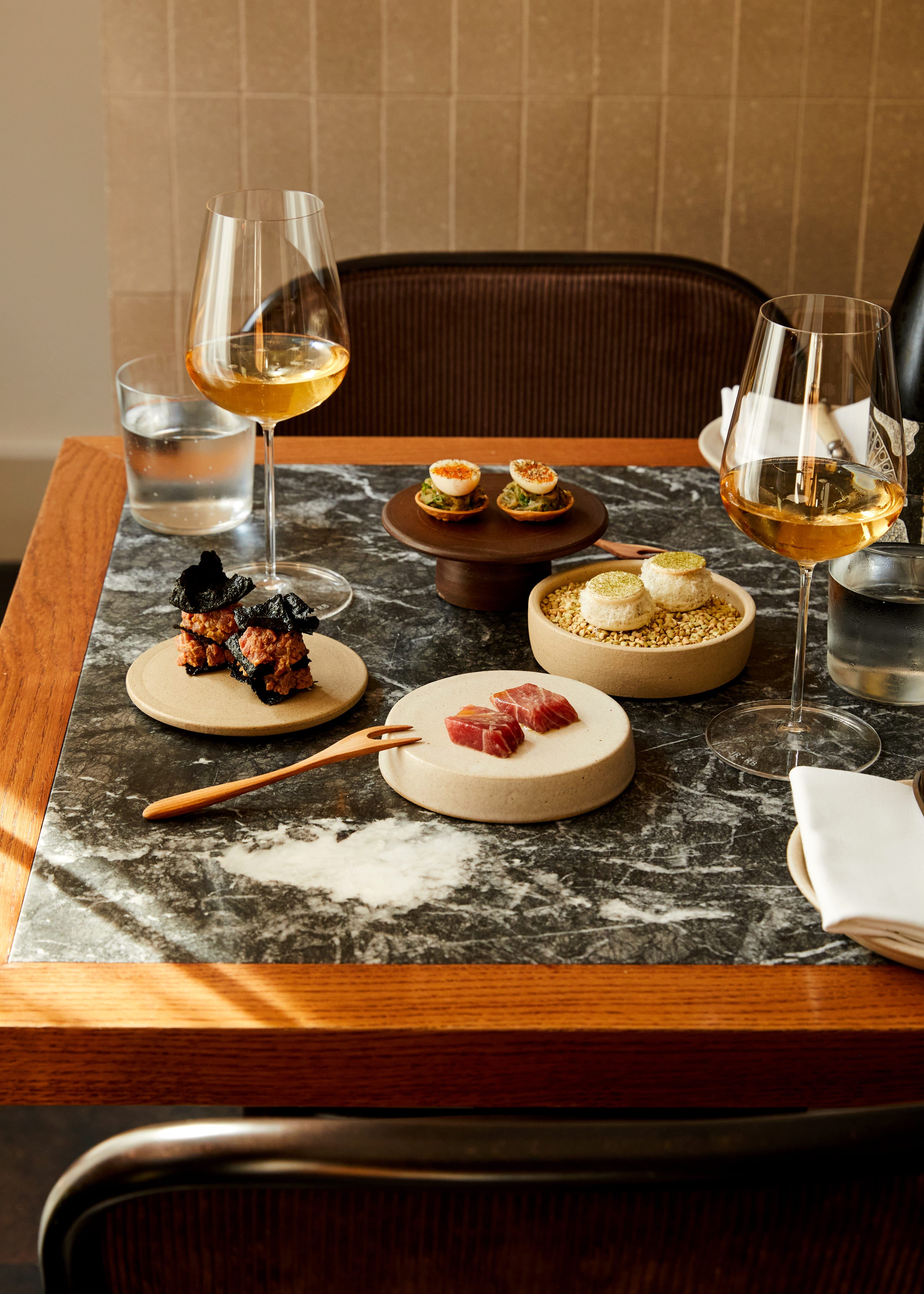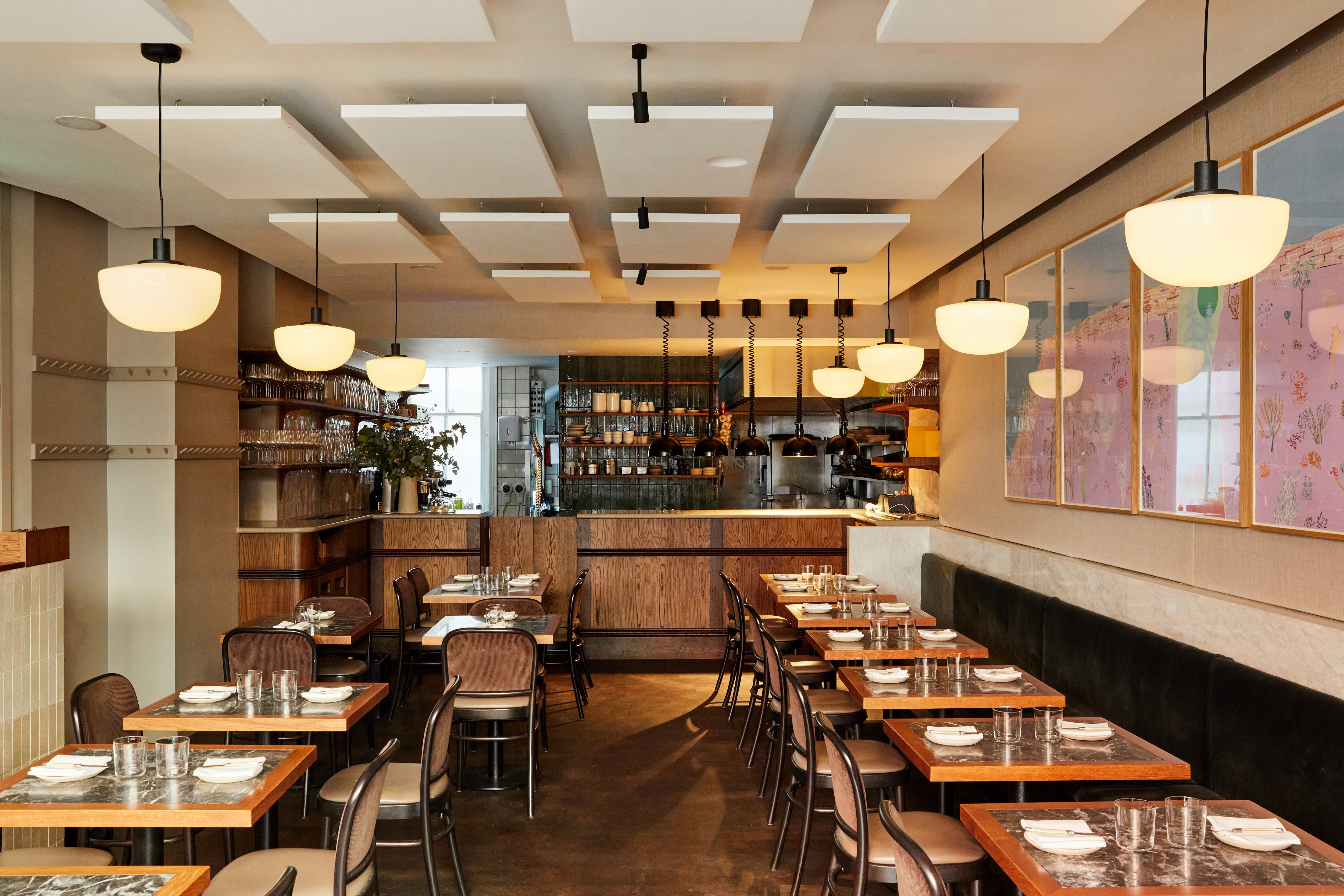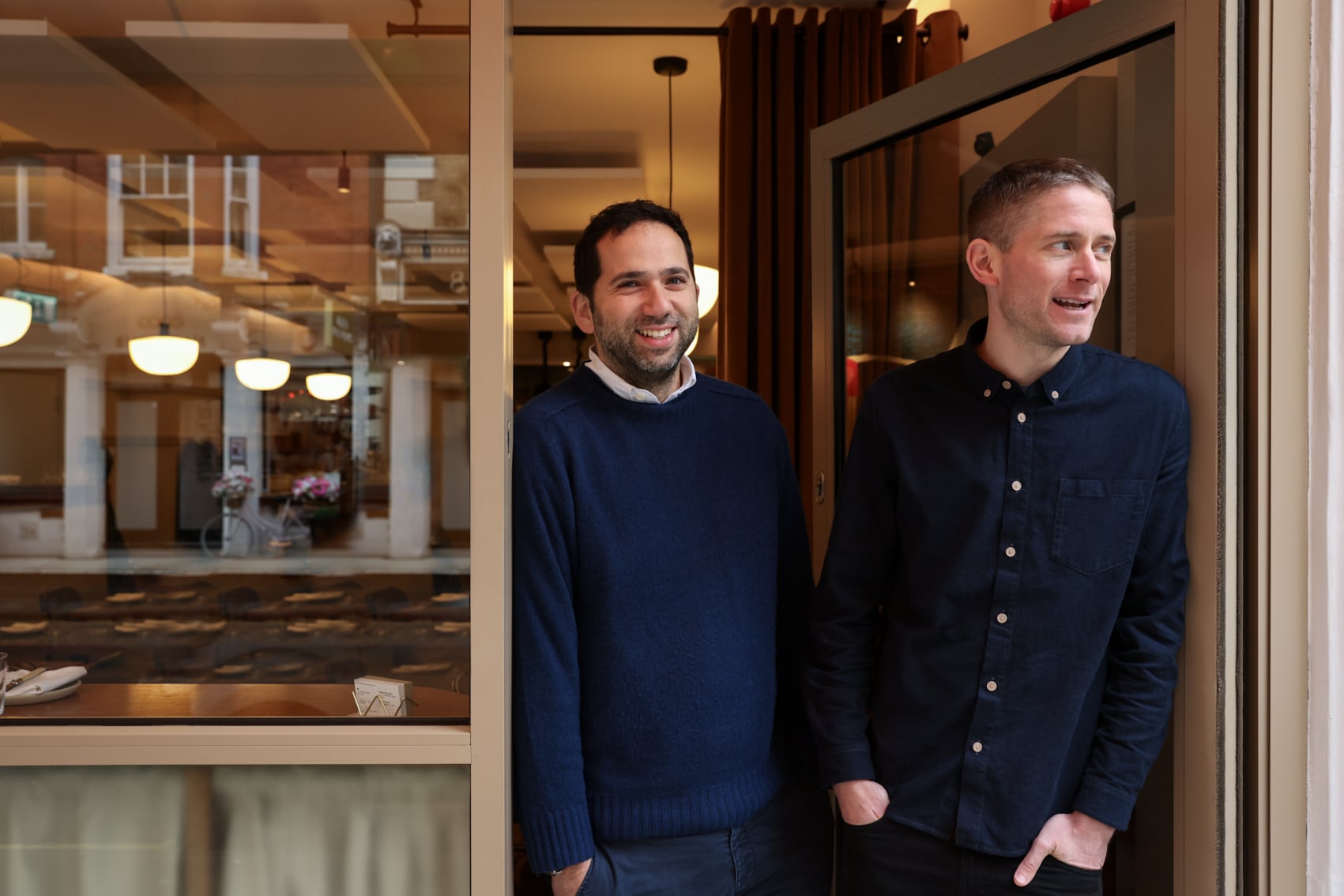Since 2015 schoolfriends Will Lander and Dan Morgenthau have been at the forefront of an informal yet highly creative dining scene in the capital with a group of restaurants that have impressed critics and launched the careers of a number of young and up-and-coming chefs. The duo behind Woodhead Restaurant Group now operates five London restaurants – the Quality Chop House and Quality Wines in Farringdon, and Michelin-starred Portland, Clipstone and 64 Goodge Street in Fitzrovia – and helped progress the impressive career of chef Merlin Labron-Johnson on these shores.
How did you two get into restaurants?
Will Lander: I already had the Quality Chop House, which I’d opened with Josie Stead two years before Portland. Before that I had worked on the floor in hospitality and had done a bit in project management. I had a brief and ignominious career in finance, but I always wanted to work in restaurants. Dan and I went to school together. He was looking to get into the restaurant business, so we started looking for a site.
Dan Morgenthau: I actually trained at Ballymaloe Cookery School in Cork and used to volunteer at a shelter called Crisis at Christmas and ended up in the kitchen there and absolutely loved it. The combination of that and not being hugely fulfilled made me take a punt and become a chef. But it turned out I was terrible at it. I worked in a kitchen but thankfully ended up on the floor at [Soho restaurant] 10 Greek Street.
WL: When we took on the Quality Chop House we were looking to open something very wine focused. Much to our benefit, someone had decided it should become a meatball only restaurant within the confines of the listed dining room, which didn’t work out.
What was the inspiration for Portland?
DM: We were early on in our journey in the industry and the site options were few and far between. We were fortunate in that Great Portland Street was going through a transition and what were previously clothing showrooms were going through a change of use with landlords looking for new tenants. The site was essentially a white box for our vision to come to life. We were very excited to be working with Merlin [Labron-Johnson, Portland’s original head chef] – he’d had an exciting career outside of the UK and came back to open with us. We wanted Portland to feel like a destination restaurant but also be somewhere you could engage on a regular basis. A lot of the people involved had worked in more traditional fine dining restaurants and they brought their ambition and sensibilities to the restaurant, but then we stripped away the tablecloths and formality. Lyle’s had opened the year before as had The Clove Club, and two or three years before that restaurants like 10 Greek Street. What Portland and these other places all had in common was they gave a platform to these incredibly exciting young chefs that had worked at some of the most respected restaurants in the country but allowed them to cook the food they wanted to.

It got a star very early on. What was its impact?
WL: The star was unexpected but very welcome. It made a huge difference.
DM: It set the tone for the level of ambition thereafter. Portland is accessible fine dining, but what we had envisaged for the restaurant was maybe something more like a neighbourhood bistro, and that’s how Clipstone came about. It opened in 2016 the year after Portland and at the beginning it was very much Portland is the one star, and Clipstone is the bistro, but they are far more in contrast to each other now.
You’ve since built a small group of successful London restaurants.
WL: Dan became partner in the Quality Chop House and Josie went to run Brawn with Ed [Wilson] and so it came into the Woodhead universe. We always had the shop, and that became Quality Wines. For the first five or six years it was just a wine bar, but it has since evolved. Then, in 2019, we opened Emilia at Bonhams Auction House. That was quite a different model, it was a concession rather than a lease, and when Covid hit they re-evaluated everything and we didn’t reopen it. Then, in 2023, we opened 64 Goodge Street.
The restaurants sit under the Woodhead Restaurant Group. Where did the name come from?
WL: It was the name of our form teacher at school (University College School in Hampstead). He was a bit of a mentor to us both.
DM: Had we had known the trajectory that our restaurant group was going to take we might have chosen a more customer-facing name.
You’ve got three Fitzrovia restaurants. What has drawn you to that area?
DM: We can get between the restaurants in 20 minutes by a bike, and we are at them every day. Proximity has always been an important part of how we’ve thought about growth, and we love Fitzrovia as an area. It is slightly underappreciated and a hinterland between more residential areas in north and central London. It’s somewhere people feel comfortable about commuting into in the evening without making the leap into Soho or town proper.

How has Portland changed over the past 10 years?
DM: Change was always built into what we did. From day one the menu was changing every few weeks or every few days. The fact that the kitchen has been in a degree of flux has been what sets Portland apart. What’s changed over the past 10 years is the degree that we can support [the team] through a more organised head office.
How are you finding the current trading environment?
WL: The end of last year was pretty strong; December was fantastic. It’s a little too early to say too much about this year but so far, it’s OK. In terms of the cost base, the changes coming in April are not ideal and introduces a certain amount of concern, but we just have to be even better at getting guests coming through the door.
DM: There’s a lot of understandable doom and gloom about the impact on the sector of the budget but over the past 10 years, half of those have been typified by existential challenges and we’ve managed to keep going and doing what we love. People’s longstanding attachment to a restaurant is such an important part of what encourages them to keep on visiting and supporting it. We want to provide an entry point for people to engage with our restaurants. At the Quality Chop House, you can get three courses for £29, at Quality Wines you can have a plate of pasta and glass of wine for £15. It means we have busy restaurants at lunch.
WL: It gives the team a lot of energy for the dinner service. A quiet lunch makes it hard to have a good dinner service, whereas a busy lunch helps with dinner, even though in theory everybody should be more tired. You’ve got momentum.

Will, your father Nick has been a restaurateur, critic and consultant. Has his experience proved helpful for you?
WL: He was massively useful on the fundamentals when I was starting out. There are very easy traps to fall into when you’re setting up a company or getting your lease sorted. He always said, your lease and licence are the two most important things, get them how you want them otherwise don’t move a step forward, which is very good advice. He has been involved but not overbearing. And he has critiqued the restaurants, but exactly the way he should have done, which was gently and from a distance. He’s our best customer.
What about the wine offer. Does your mother (wine writer Jancis Robinson) have any input?
WL: All our sites take wine very seriously. At the beginning I was very involved but now we have five heads of wine – we don’t use the term sommelier – and all have total ownership of the list. It doesn’t help to interfere too much. They have spent years studying and tasting so that they can share their passion, and I never want to put them in strait jacket of what we want.
Where do you like to eat?
WL: I like eating at 40 Malty Street. Steve’s [Williams] food is incredibly complex and delicious using technique that you’d expect from somewhere fancy, but it’s served in this warehouse in Bermondsey.
DM: I live in Islington and when my wife and I can get out to eat we go to Trullo. To have a restaurant that is so consistently delicious and a dining experience with such warmth is something we aspire to. I recently went to Osip in Somerset. To see Merlin’s singular creative vision come to life in a new space was really inspiring.
Do you always agree on things?
WL: We always know how we might slightly disagree before we actually do it and so we navigate towards the right answer pretty quickly. We’re pretty similar. When we both walk into a restaurant, we know what we want it to be like and how it should feel.
What’s next for Woodhead?
WL: We are not averse to doing more but I don’t think the next thing will be a revival of Emilia or anything we did in lockdown. It will be something that fits whatever space we find.
DM: We are not beholden to any growth plan. The process of opening a restaurant is very involved and exhausting and you need the amnesia to kick in to get to the stage when you want to do it again. We are now at the stage where should the right opportunity present itself, we’d like to do something new.


